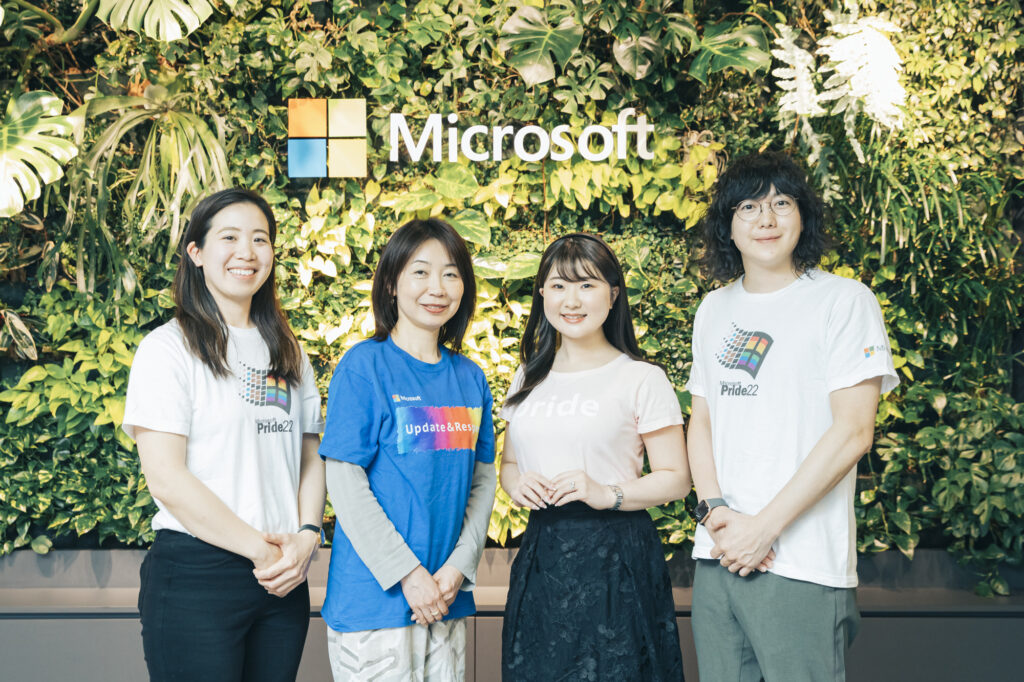 D&Iはビジネスに直結する
D&Iはビジネスに直結する
日本マイクロソフトの取り組み
日本マイクロソフトではLGBTQ+の社員コミュニティ「GLEAM」が意欲的に活動している。その背景にあるのが、ダイバーシティ&インクルージョンがビジネスに直結するという考え方だ。GLEAMのコアメンバーに、これまでの活動と今後の課題を聞いた。
写真右から
Customer Service & Support, サポート エンジニア
髙橋 匡晴 ( たかはし まさはる )さん
クラウド&ソリューション事業本部 ソリューションスペシャリスト
相田 紗英 (あいだ さえ)さん
執行役員 政策渉外・法務本部長
大島 葉子 (おおしま ようこ)さん
社長室 ビジネスプログラムマネージャー
篠田 景子 (しのだ けいこ)さん
聞き手・文/宇田川しい
写真/案納 真里江
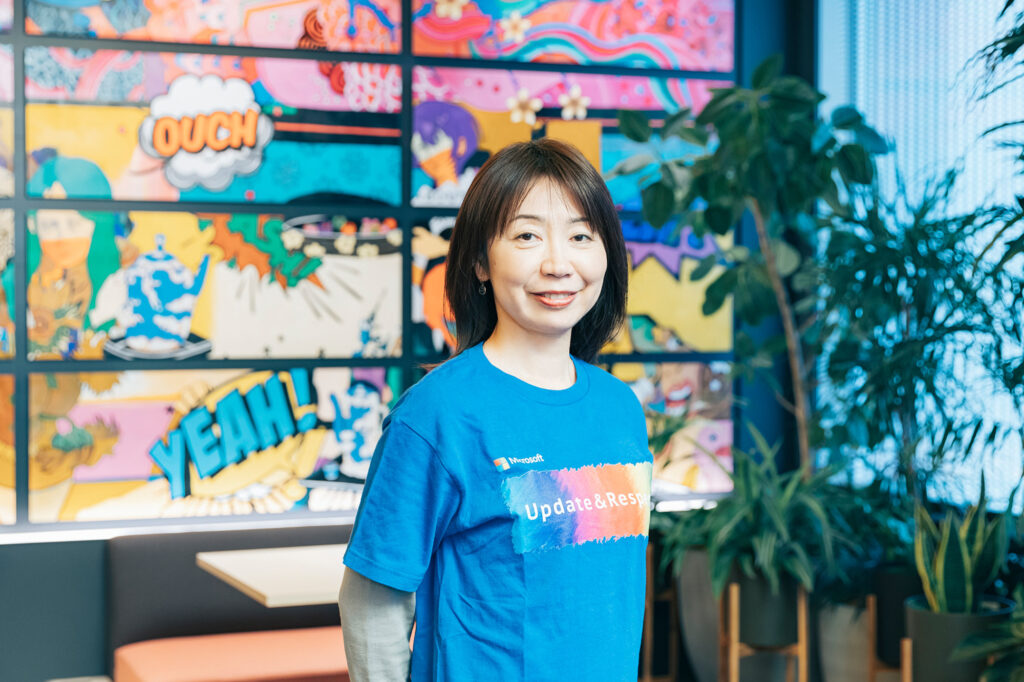 大島 葉子さん
大島 葉子さん
ミッションと深く結びついた
ダイバーシティ&インクルージョン
――マイクロソフトという名前や、その製品はよく知られていますが、どのような会社なのかカルチャーについて教えていただけますか?
大島 葉子さん 私たちは企業ミッションとして「地球上のすべての個人とすべての組織が、より多くのことを達成できるようにする」ことを掲げています。このミッションを実現するために重要なカルチャーのひとつに規定しているのがダイバーシティ&インクルージョンです。人種、国籍、性別、年齢、障碍、性的指向、性同一性、価値観、働き方など、多様性を認め、尊重し、社員がのびのびと働ける環境が、最大限のアウトプットにつながります。D&Iは会社の業績につながる根本的で重要な要素と考えています。
――D&Iを実現するための施策としてどのようなものがありますか?
大島 社内にLGBTQ+の社員コミュニティー「GLEAM (Global LGBTQIA+ Employees and Allies at Microsoft)」があります。本日、集まっているのも日本のメンバーです。また人事面でもサポートがあります。そして、社長をはじめ役員が折りに触れD&Iの重要性について発信しています。リーダーがどのような価値観を持っているかというのは重要です。
――GLEAMについて詳しく教えてください。
篠田 景子さん アメリカでは1980年代から社員の間でLGBTQ+コミュニティが始まりました。これが今日のGLEAMです。日本では2013年に支部が発足し、今年で10周年となりました。現在、参加者は200名ほどにまで増え、私が共同代表を務めています。
相田 紗英さん 数年前までは70名ほどでしたので、関心の高まりを感じます。
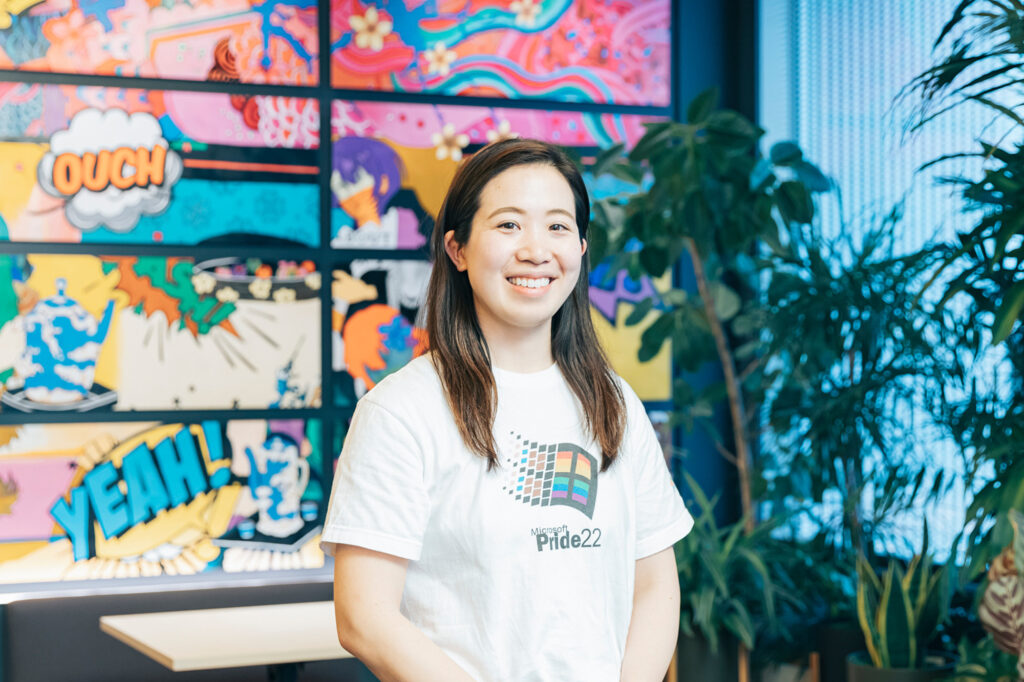 篠田 景子さん
篠田 景子さん
LGBTQ+の
リアルを知ってもらうために
――具体的にどのような取り組みをしてきたのでしょうか。
篠田 はじめは就業規則を変えていくことに取り組みました。たとえば、結婚休暇という制度がありますが、2013年当時は就業規則に同性婚や事実婚の場合の取り扱いについて書かれていなかったので、社員から見ると制度が使えるかどうかわからない状態でした。これを就業規則を変更して同性婚や事実婚を含むように明記することで、安心して申請できるようになりました。
相田 もともとは制度を利用するために上長に承認を得た上で人事部に申請をする必要がありました。上長にカミングアウトすることになるので心理的にハードルがあったのですが、上長の承認を廃止することにより制度が利用しやすくなりました。同性カップルはもちろん、法律婚をしている人たちも利用しやすくなったんです。
大島 現在、就業規則は、企業として可能な範囲において同性カップルも異性カップルも同様に扱うようになっています。そうした社内的な環境整備を経て、現在の活動は、LGBTQ+当事者や、当事者を巡る環境の理解を社会的に深めていくという点に重点を置くようになりました。イベントで、ここにいるGLEAMのコアメンバーが、家族にカミングアウトした時の体験を語ったり、また外部スピーカーとしてTRPの共同代表である杉山文野さんに来ていただくなどして、LGBTQ+のリアルを知ってもらう努力を続けてきました。
篠田 私はレズビアンですが、一緒に生きていきたい大切なパートナーがいます。先日の社内で開催されたD&Iイベントでは、日本ではまだそんなパートナーと結婚が出来ないんですと話しました。いち社員としての経験をシェアするのがいちばん響くと思ったからです。同性婚について身近な話題なのだと捉えてもらえました。
髙橋 匡晴さん D&Iイベントで話を聞いた同僚から、次回もこういうイベントがあったら参加したいですとか、アライとして一緒にコミュニティ活動をしたいという声を多くもらいました。D&Iについて理解し、実現に向けて一歩を踏み出す後押しになったと思います。
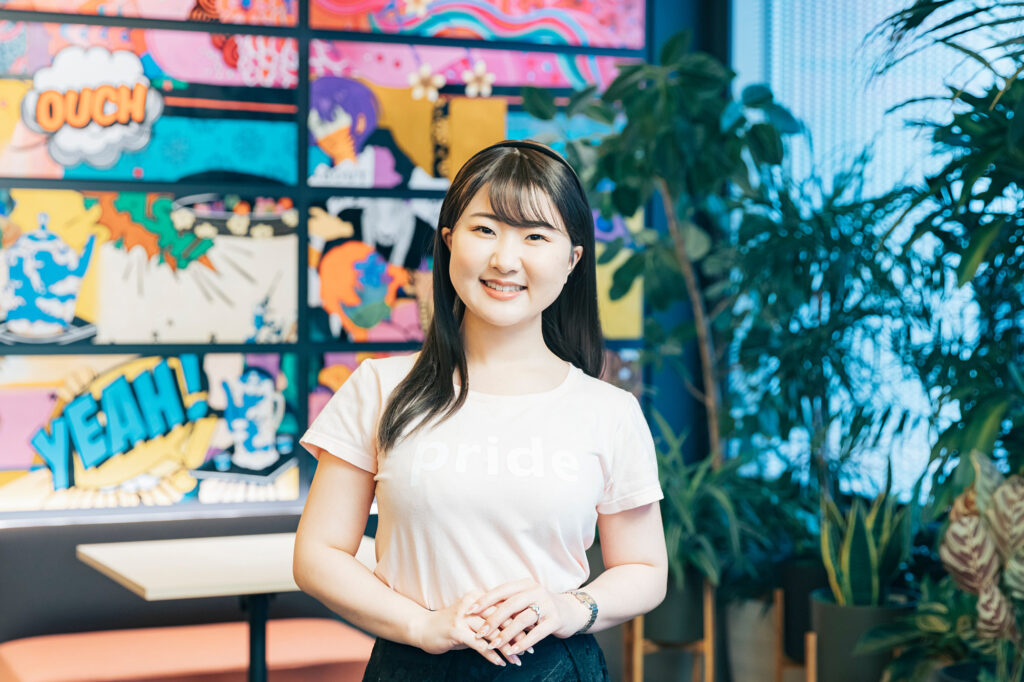 相田 紗英さん
相田 紗英さん
同性婚の問題は
日本経済に直結している
――D&Iがビジネスに必要不可欠なトピックであるという考えはよくわかりました。一方で人権という観点からも捉えられると思いますが。
大島 同性婚はまさに人権の問題だと思います。しかし、同時にビジネスに直結してくる問題でもあります。2018年に在日米国商工会議所が同性婚実現を勧告する提言をしていて、婚姻の自由がないために、世界の優秀な人材が来日を忌避すると危惧しています。
相田 私の周囲には、日本では同性婚が出来ないから海外に行こうと考えている人や、実際に海外に行った人もいます。人権問題に取り組むことは日本の経済にも直結しているのではないでしょうか。
篠田 私はテクノロジーへのアクセスも人権だと思っています。マイクロソフトの製品はさまざまな人が使用します。たとえば視覚に障碍を持つ人、タイプが打てない人もいるでしょう。誰もが同じようにテクノロジーにアクセスが出来るということを私たちは目指していて、仕事の根幹にD&Iがあるのだと思います。
相田 具体的な製品をあげると、Xboxでは通常のコントローラーでは操作しにくい人に向けたアダプティプ・コントローラーがありますし、Surfaceでも視覚に障碍のある人や、指先が不自由な人のためのアダプティブ・キットを用意しています。
大島 個人の尊重ということと、ビジネスというのは切り離せないくらい繋がっているということではないでしょうか。
――ミッションを大切にしているというのは外資系企業らしいと思います。社内の雰囲気もやはり外資系からイメージするようなものなのでしょうか?
高橋 外資系企業というとやはり、個々のパフォーマンスが重視され、チームで協業するというより、個々人でパフォーマンスを発揮するというイメージではないでしょうか。私も以前はそんな印象を持っていましたが、入社してみたら全く違いました。チームでパフォーマンスを出すというところをとても大切にしています。誰かのパフォーマンスが少し十分でないとか、誰かが困っているというようなことがあれば、周囲の人が積極的に手を手を差し伸べるんです。ワン・チーム、OneMicrosoftという考え方が浸透しています。他者貢献に溢れた環境ですね。
大島 人事の評価軸としても、個人のパフォーマンスの他に、他者への貢献ということがあります。単に社風というより、制度化されているんです。他者を尊重する、理解することが求められる企業だと言えます。
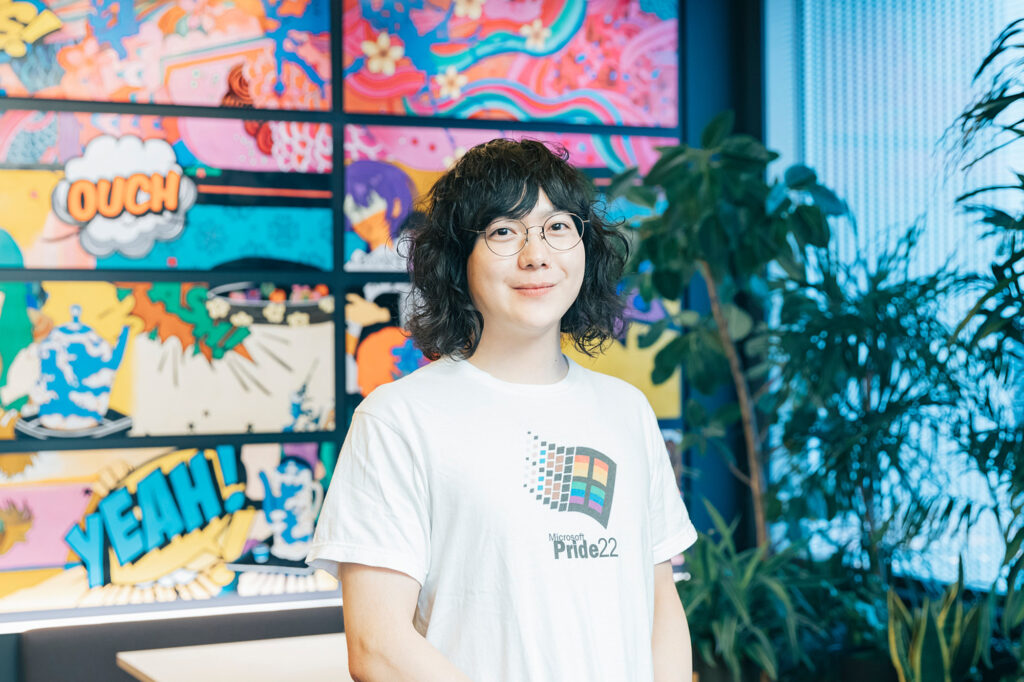 髙橋 匡晴さん
髙橋 匡晴さん
今こそ
変わっていける日本に
――今年のTRPのテーマは「変わるまで、続ける」です。皆さんは何を変えたいと思っていますか。
高橋 これまでの活動を通してD&Iについて一定の理解はされてきていると思います。これからは、その理解の解像度をより上げていきたいです。
大島 私は、なんといっても婚姻の平等の実現ですね。
相田 先ほど、同性婚が出来ないために海外に出て行った知人がいると言いましたが、同性婚の実現は、やはり重要ですね。
篠田 私にも、当事者の友人が多くいますが、結婚、子育てを考えると海外に行くしかないと言う人は少なくないんです。でも、皆さん、本当は日本を離れたくないとも言うんです。生まれ育った場所だし、たいせつな家族、友人、キャリアがあるわけですから。でも、選択肢がないから離れざるを得ないんです。これは悲しいことですよね。
LGBTQ+に限らず、誰もがありたい姿で生きていける社会に変わってほしい。変わっていける日本になってほしいと思います。
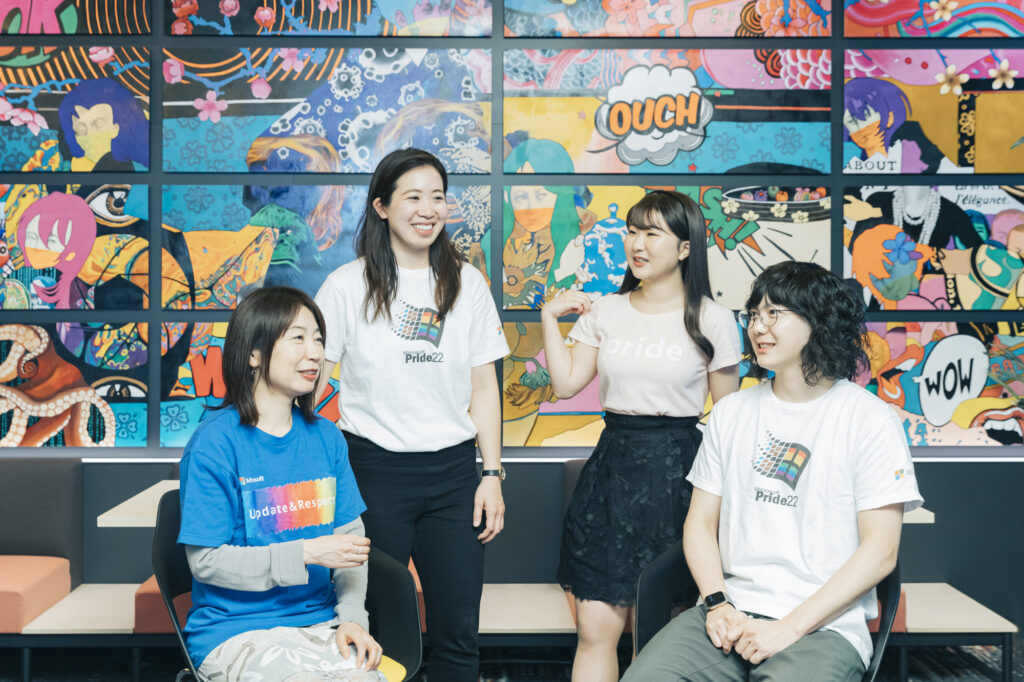
 D&I is Directly Related to Business: Microsoft Japan’s Efforts
D&I is Directly Related to Business: Microsoft Japan’s Efforts
Microsoft Japan Sees Inextricable Link between Diversity & Inclusion and Business Growth
D&I is Directly Related to Business: Microsoft Japan’s Efforts
Microsoft Japan Sees Inextricable Link between Diversity & Inclusion and Business Growth
From right to left
Customer Service & Support, Support Engineer
Masaharu Takahashi
Solution Specialist, Specialist Team Unit
Sae Aida
Assistant General Counsel
Japan Lead
Corporate, External and Legal Affairs
Yoko Oshima
Business Program Manager, Office of the President
Keiko Shinoda
Interviewer / Text by Shinie Udagawa
Photo/Marie Kanno
 Ms. Yoko Oshima
Ms. Yoko Oshima
Aligned with Our Mission: A Strong Commitment to Diversity & Inclusion
– Microsoft is a recognized brand with widely-used products, but could you share with us some insights into the company’s culture?
Yoko Oshima: At Microsoft, our corporate mission is to empower every person and every organization on the planet to achieve more. To accomplish this goal, we place great emphasis on fostering a culture of diversity and inclusion. We firmly believe that D&I is not only fundamental but also essential for driving the company’s overall performance.
– What specific steps is your organization taking to actualize its commitment to promoting diversity and inclusion?
Oshima: We have established an in-house employee community called GLEAM (Global LGBTQIA+ Employees and Allies at Microsoft), which actively supports and advocates for LGBTQ+ individuals. The members we have here today represent the Japanese branch of GLEAM. In addition, we provide extensive human resources support for promoting diversity and inclusion. Our president and other board members continuously emphasize the significance of D&I within the organization. Understanding the values held by our leaders is crucial to promoting a culture of inclusivity.
– Please tell us more about GLEAM.
Keiko Shinoda: GLEAM originated in the U.S. in the 1980s when LGBTQ+ employees began organizing to create a more inclusive workplace. In Japan, the GLEAM chapter was established in 2013, and this year we are celebrating our 10th anniversary. Presently, we have approximately 200 members, and I am honored to serve as co-chair of the community.
Sae Aida: Not too long ago, we had around 70 members in the community. However, in recent years, we have noticed a significant increase in interest and participation
 Keiko Shinoda (photo)
Keiko Shinoda (photo)
Raising Awareness about the Realities Faced by the LGBTQ+ Community
– Could you elaborate on the concrete actions that you have taken to advance your organization’s commitment to diversity and inclusion?
Shinoda: Initially, we focused on revising our employment policies. For instance, we had a leave system for marriages, but in 2013, there were no clear guidelines on how to handle same-sex or de facto marriages, which created confusion among employees who were uncertain whether they could utilize the system. To address this issue, we revised our employment regulations to explicitly include same-sex and de facto marriages, enabling employees to take advantage of this benefit without hesitation.
Aida: Previously, in order to use the system, employees had to first obtain approval from their superiors and then apply to the Human Resources Department, which presented a psychological barrier as it required individuals to disclose their sexuality to their superior. By eliminating the requirement for superior approval, the system is now more accessible and less intimidating for employees to use. This change has made it easier for same-sex couples as well as those who are legally married to access the system.
Oshima: Presently, we have amended our employment regulations to treat same-sex couples and opposite-sex couples equally to the extent that is feasible for a company. With our internal environmental improvements in place, our current efforts are geared towards raising social awareness of LGBTQ+ individuals and the challenges they face. For instance, we organize events where GLEAM’s core members share their coming out experiences to their families, and invite external speakers such as Fumino Sugiyama, co-chair of TRP, to talk about related issues.
Shinoda: As a lesbian, I have a partner with whom I would like to spend the rest of our lives together. During a recent D&I event held within the company, I shared that I am unable to legally marry my partner in Japan. I thought that by sharing my personal experience as an employee of the company, it would resonate with those attending the event and help deepen their understanding of the challenges faced by the LGBTQ+ community.
Masaharu Takahashi: My talk at the D&I event was well received by my colleagues. Many of them approached me afterwards, expressing their interest in participating in the next event and working with me as an ally in community activities. It was heartwarming to see such support and I believe it shows that our efforts to promote D&I are making a positive impact within the company.
 Sae Aida (photo)
Sae Aida (photo)
The Issue of Same-Sex Marriage Directly Impacts the Japanese Economy
– You consider D&I to be crucial to business success, however, do you believe that promoting D&I is also a matter of upholding human rights?
Oshima: While same-sex marriage is undoubtedly a human rights issue, it is also important to consider the impact it has on businesses. For instance, in 2018, the American Chamber of Commerce in Japan made a recommendation to legalize same-sex marriage, highlighting the potential talent drain that Japan could face if it fails to adopt more progressive policies. Therefore, it is essential for companies to understand that promoting D&I is not only a moral imperative but also a business imperative that can have far-reaching consequences.
Aida: The fact that many people I know around me are considering going abroad or have already done so because same-sex marriage is not legal in Japan shows how human rights issues are directly linked to the country’s economy. I believe that addressing these issues is crucial for Japan’s economic growth and competitiveness on the global stage.
Shinoda: I strongly believe that equal access to technology is a basic human right. Since Microsoft products are used by people with diverse backgrounds, including those with visual impairments or those who are unable to type, it is our responsibility to ensure that everyone has equal access to technology. In my opinion, D&I plays a vital role in achieving this goal and is at the core of our work at Microsoft.
Aida: Let me provide you with some examples of our products that are designed to promote accessibility and inclusivity. Xbox has an adaptive controller, which allows people with disabilities to play games by using alternative input devices. Similarly, our Surface line of products has an adaptive kit that includes features like high contrast mode and on-screen keyboard, making it easier for people with visual impairments or finger disabilities to use them.
Oshima: This all shows that there is a strong link between respect for the individual and business success, as one cannot exist without the other.
– How does the company culture at your organization compare to what one might expect from a foreign-affiliated company, given the emphasis placed on the company’s mission?
Takahashi: While the image of a foreign-affiliated company may emphasize individual performance, my experience at this company has been quite different. At Microsoft, teamwork is highly valued and we strive to work together towards our goals. If someone is struggling or needs assistance, there is always someone willing to help out. The One Team, One Microsoft concept is at the core of our work culture, where everyone is encouraged to contribute and support each other.
Oshima: In addition to individual performance, our personnel evaluation axis is based on contributions to others. It is not simply a matter of corporate culture; it is institutionalized. It is a company that demands respect and understanding of others.
 Masaharu Takahashi (photo)
Masaharu Takahashi (photo)
Japan’s Need for Change: Why Now is the Time
– How do you interpret the theme “Press on till Japan Changes” for this year’s TRP, and what specific changes would you like to see happen?
Takahashi: Our past activities have helped people gain a certain level of understanding of D&I. Moving forward, my goal is to enhance and deepen that understanding even further.
Oshima: In my view, the most critical issue is the realization of marriage equality.
Aida: As I mentioned earlier, I know several individuals who have left Japan to seek same-sex marriage elsewhere. So for me, the most important thing is to work towards the realization of same-sex marriage in Japan.
Shinoda: I have several friends who are involved in this issue, and many of them express that they feel compelled to go abroad when they think about marriage and raising children. However, they also express that they don’t really want to leave Japan. It’s where they were born and raised, and they have important connections to their families, friends, and careers. Unfortunately, they feel that they have no other option but to leave. It’s a heartbreaking situation. I hope to see Japan evolve into a society where everyone, not just those who identify as LGBTQ+, can live their lives the way they want. I want Japan to be a country that can bring about positive change.























-234x60.png)












































-234x60.jpg)




-234x60.png)



























-234x60.png)








-234x60.png)









-120x60.png)





-120x60.png)






